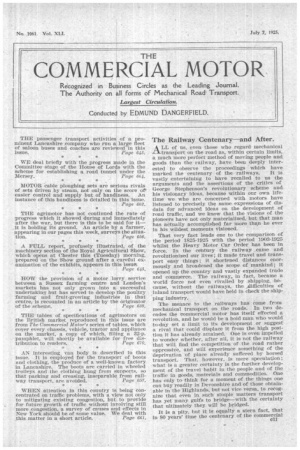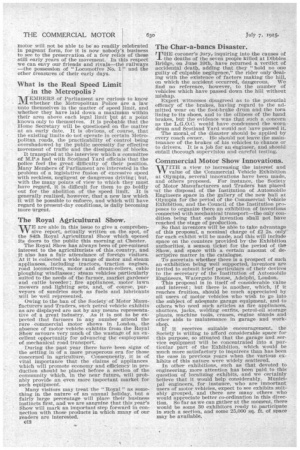The Railway Centenary—and After.
Page 1

Page 2

If you've noticed an error in this article please click here to report it so we can fix it.
A LL of us, even those who regard mechanical -C1.-transix)rt on the road as, within certain limits, a much more perfect method of moving people and goods than the railway, have been deeply interested to observe the proceedings which have marked the centenary of the railways. It is vastly entertaining to have recalled to us the arguments and the assertions of the critics of George Stephenson's revolutionary scheme and his visionary ideas, because within our own lifetime we who are concerned with motors have listened to precisely the same expressions of disdain for advanced ideas on the development of road traffic, and we know that the visions of the pioneers have not only materialized, but that man has actually accomplished far more than he ever In his wildest moments visioned.
That very fact leads one to the comparison of the period 1825-1925 with the period 1903-1925 whilst the Heavy Motor Car Order has been in force. In the century the railway came and revolutionized our lives ; it made travel and transport easy things; it shortened distances enormously and broadened the scope of mankind ; it opened up the country and vastly expanded trade and commerce. The railway, in fact, became a world force not even rivalled by shipping, because, without the railways, the „difficulties of inland transport would have held in cheek the shipping industry.
The menace to the railways has come from mechanical transport on the roads. In two decades the commercial motor has itself effected a revolution, and he would be a bold man who would to-day set a limit to its development or suggest a rival that could displace it from the high position it has already attained. One is even impelled to wonder whether, after all, it is not the railway that will find the competition of the road rather oppressive, and will experience something of the deprivation of place already suffered by horsed transport. That, however, is mere speculation ; what is a greater certainty is the further development of the travel habit in the people and of the traffic in goods, materials and commodities. One has only to think for a moment of the things one can buy readily in Devonshire and of those obtainable in the Highlands, but not vice versa, to recognize that even in such simple matters transport has yet many gulfs to bridge—with the certainty that ultimately they will be bridged.
It is a pity, but it is equally a stern fact, that in 80 years' time the centenary of the commercial motor will not be able to be so readily celebrated in pageant form, for it is now nobody' business to see to the preservation of a few relics of these still early years of the movement. In this respect we can envy our friends and rivals—the railways —the possession of "Locomotive No. 1" and the other treasures of their early days.
What is the Real Speed Limit in the Metropolis ?
It/I-EMBERS of Parliament are curio 11a-whether the Metropolitan Police unto themselves in the matter of speed whether they have laid down a maxim their area above each legal limit hut known only to themselves. It is probab Home Secretary will be questioned on
to know re a law limit, and in within t a point that the e matter at an early date. It Is obvious, of course, that the existing limits do not operate in certain Metropolitan roads, the practicability of control being overshadowed by the public necessity for effective movement of traffic and the dissipation of blocks.
It transpired at the interview which a committee of M.P.s had with Scotland Yard officials that the police feel the great difficulty of their position. Many Members of Parliament are interested in the problem of a legislative fusion of excessive speed with reckless, negligent or dangerous driving; but, with the many points of view to which they must have regard, it is difficult for them to go boldly out for the abolition of the speed limit. It is generally realized, however, that a new law which it will be possible to enforce, and which will have regard to present-day conditions, is daily becoming more urgent.
The Royal Agricultural Show. The Royal Agricultural Show.
NvE are able in this issue to give a comprehensive report, actually written on the spot, of the 84th Royal Agricultural Show which opened its doors to the public this morning at Chester.
The Royal Show has always been of pre-eminent interest to the agriculturists of this country, and It also has a fair attendance of foreign visitors. 'At it is collected a wide range of motor and steam appliances, including tractors, traction engines, road locomotives, motor and steam-rollers, cable ploughing windlasses ; steam vehicles particularly suited to the needs of the farmer, market gardener and cattle breeder ; fire appliances, motor lawn mowers and lighting sets, and, of course, purveyors of sundries such as fuels and lubricants will be well represented.
Owing to the ban of the Society of Motor Manufacturers and Traders, such petrol vehicle exhibits as are displayed are not by any means representative of a great industry. As it is not to be expeeted that farmers in any number attend the rare commercial motor shows in London, the absence of motor vehicle exhibits from the Royal Show savours very much of the wastage of an excellent opportunity for advancing the employment of mechanical road transport.
During the past year there have been signs of the setting in of a more prosperous era for those concerned in agriculture. Consequently, it is of vital importance that the claims of appliances which will promote economy and efficiency in production should be placed before a section of the community which in the near future., will probably provide an even more important market for such equipment.
Many visitors may treat the " Royal " as something in the nature of an annual holiday, but a fairly large percentage will place their business instincts first, and we are sanguine that this year's Show will mark an important step forward in connection with those products in which many of our readers are interested.
012
The Char-a-bancs Disaster.
rpHE coroner's juryr inquiring into the causes of
the deaths of the seven people killed at Dibbles Bridge, on June 10th, have returned a verdict of accidental death, adding that they "hold no one guilty of culpable negligence," the rider only dealing with the existence of factors making the hill, on which the accident occurred, dangerous. We find no reference, however, to the number of vehicles which have passed down the hill without mishap.
Expert witnesses disagreed as to the potential efficacy of the brakes, having regard to the admitted wear on the foot-brake drum and the torn lining to its shoes, and to the oiliness of the hand brakes, but the evidence was that such a concern as the L.G.O.C. would have condemned the worn drum and Scotland Yard would not :lave passed it.
The moral, of the disaster should be applied by every coach owner. He should not leave the maintenance of the brakes of his vehicles to chance or to drivers. It is a job for an engineer, and should entail thorough supervision and careful testing.
Commercial Motor Show Innovations.
WITH a view td, increasing the interest and value of the Commercial Vehicle Exhibition at Olympia, several innovations have been made, and others proposed. For instance, the Society of Motor Manufacturers and Traders has placed at the disposal of the Institution of Automobile Engineers space in the gallery of the new hall at Olympia for the period of the Commercial Vehicle Exhibition, and the Council of the Institution proposes to organize there an exhibition of inventions connected with mechanical transport—the only condition being that each invention shall not have reached the stage of production.
So that inventors will be able to take advantage of this proposal; a nominal charge of 12 2s. only for each exhibit will be made, and this will include space on the counters provided by the Exhibition authorities, a season ticket for the period of the Show, and space with a certain amount of descriptive matter in the catalogue.
To ascertain whether there is a prospect of such an exhibition being well supported, inventors are Invited to submit brief particulars of their devices to the secretary of the Institution of Automobile Engineers, Watergate House, Adelphi, London.
This proposal is in itself of considerable value and interest; but there is another, which, if it reaches fruition, shOuld be much appreciated by all users of motor vehicles who wish to go into the subject of adequate garage equipment, and to others who need such articles as fire appliances, shutters, jacks, welding outfits, petrol-oil storage plants, machine tools, cranes, engine stands and other aids to maintenance in garage and workshop.
If it receives suitable encouragement, the Society is willing to afford considerable space for this purpose, so situated that the garage and service equipment will be concentrated into a particular part of the Exhibition, which would be much more satisfactory to inquirers than has been the case in previous years when the various exhibits of this nature were widely scattered.
In other exhibitions, such as that devoted to engineering, more attention has been paid to this question of localizing exhibits, and we certainly believe that it would help considerably. Municipal engineers, for instance, who are important users of motor vehicles, expect to see exhibits suitably grouped, and there are many others who would appreciate better co-ordination in this direction. So far as we can gather at the moment, there would be some 30 exhibitors ready to participate in such a section, and some 25,000 sq. ft. of space may be available.














































